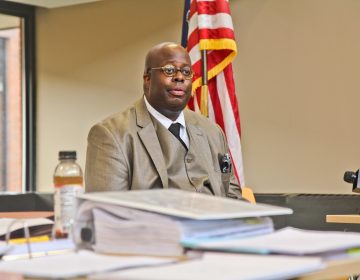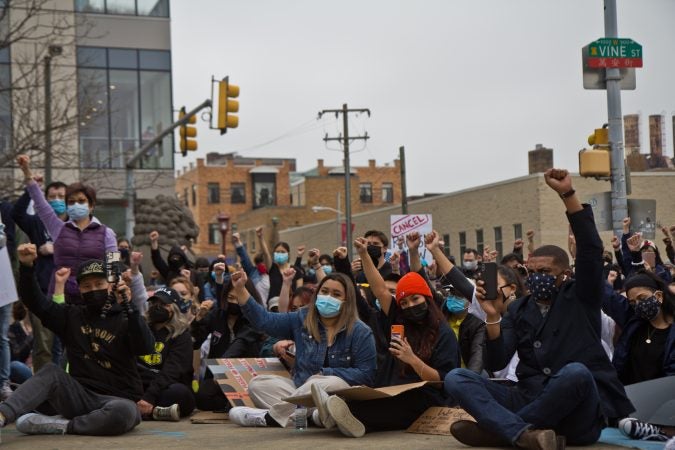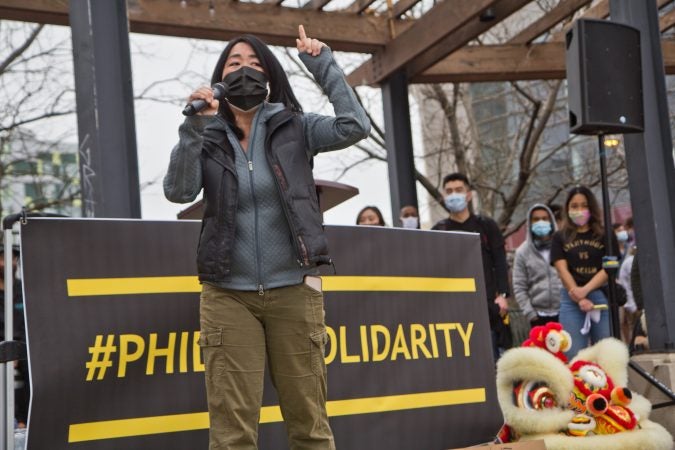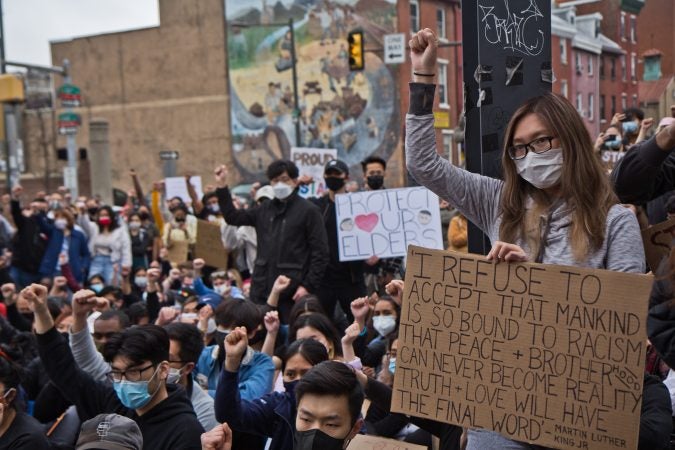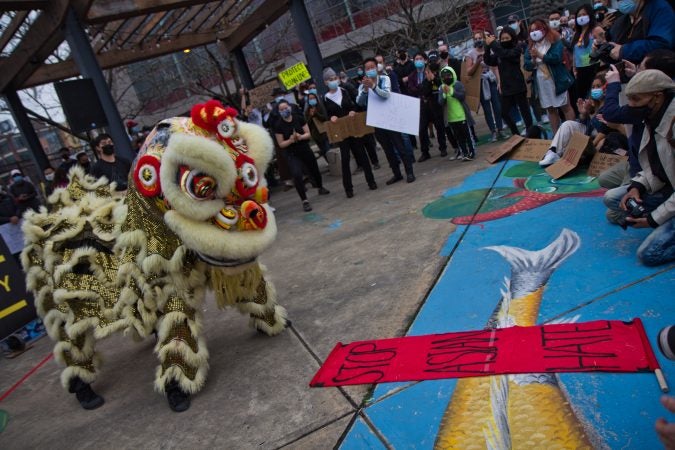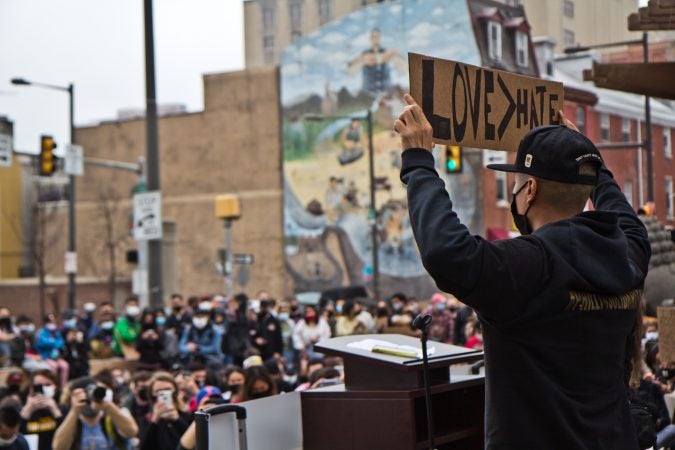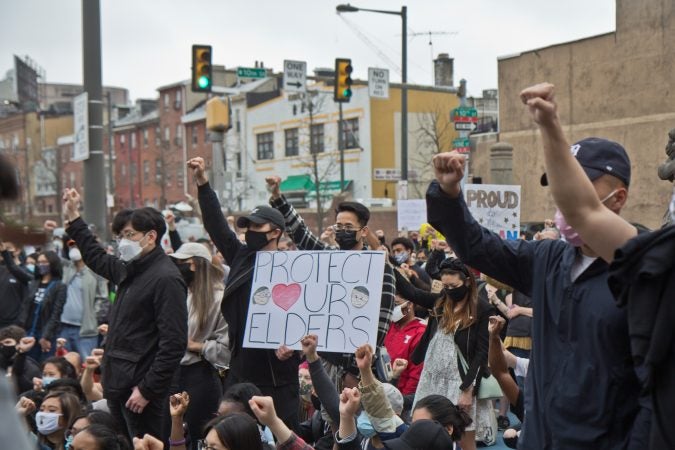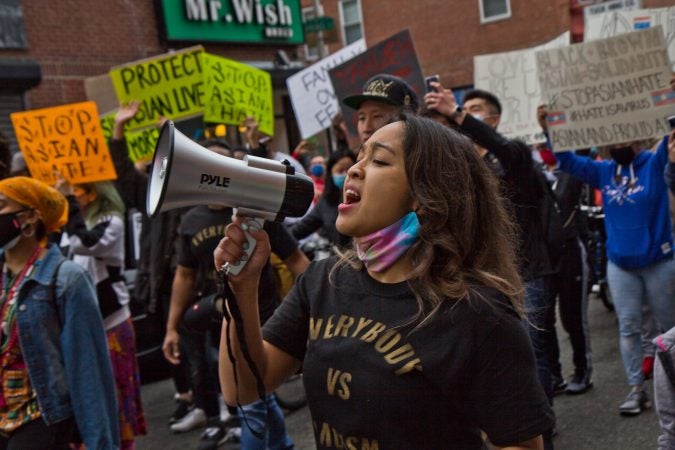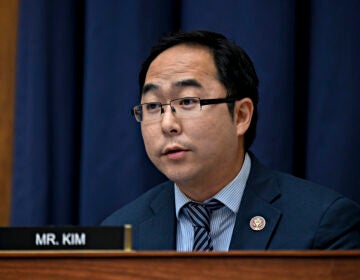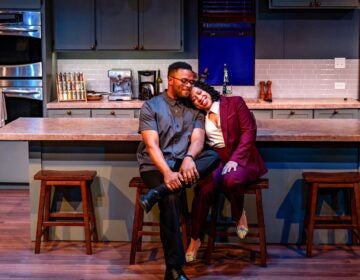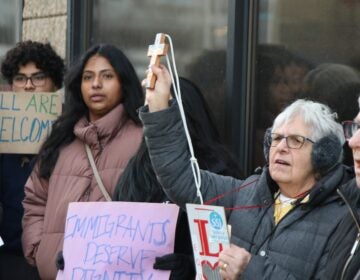‘I do not feel safe’: Over 300 rally in Chinatown against anti-Asian violence, harassment
The rally and march were held to honor the 8 victims of last week’s shooting in the Atlanta area and support the city’s own Asian American and Pacific Islander communities.
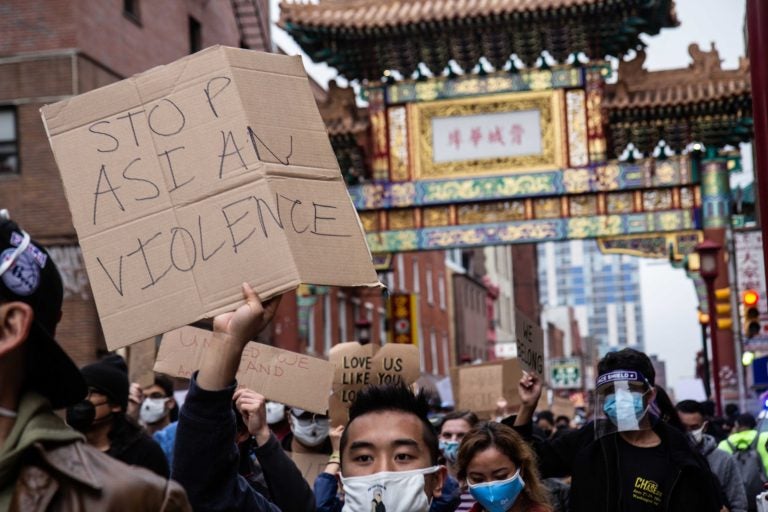
Philadelphians gathered on 10th street in Chinatown for a solidarity rally and march against violence directed at Asian Americans on March 25, 2021. (Kimberly Paynter/WHYY)
More than 300 people gathered at 10th and Vine streets in Chinatown Thursday evening to honor the eight victims of last week’s shooting in the Atlanta area and to support the city’s own Asian American and Pacific Islander communities.
While several aspects of the event were reminiscent of racial justice protests from the summer, notably absent were demands from the community.
“Not yet,” said Will Lex Ham, who made the trip from New York City to speak at the event. “We need these rallies as a space to grieve, to mourn, to heal, to connect and build upon our collective power.”
Six of the women killed by a white man in the Atlanta-area spa shootings were of Asian descent, leaving Philadelphia communities on edge. But even more traumatic, said several of the rally’s attendees, is how law enforcement has discussed the homicides.
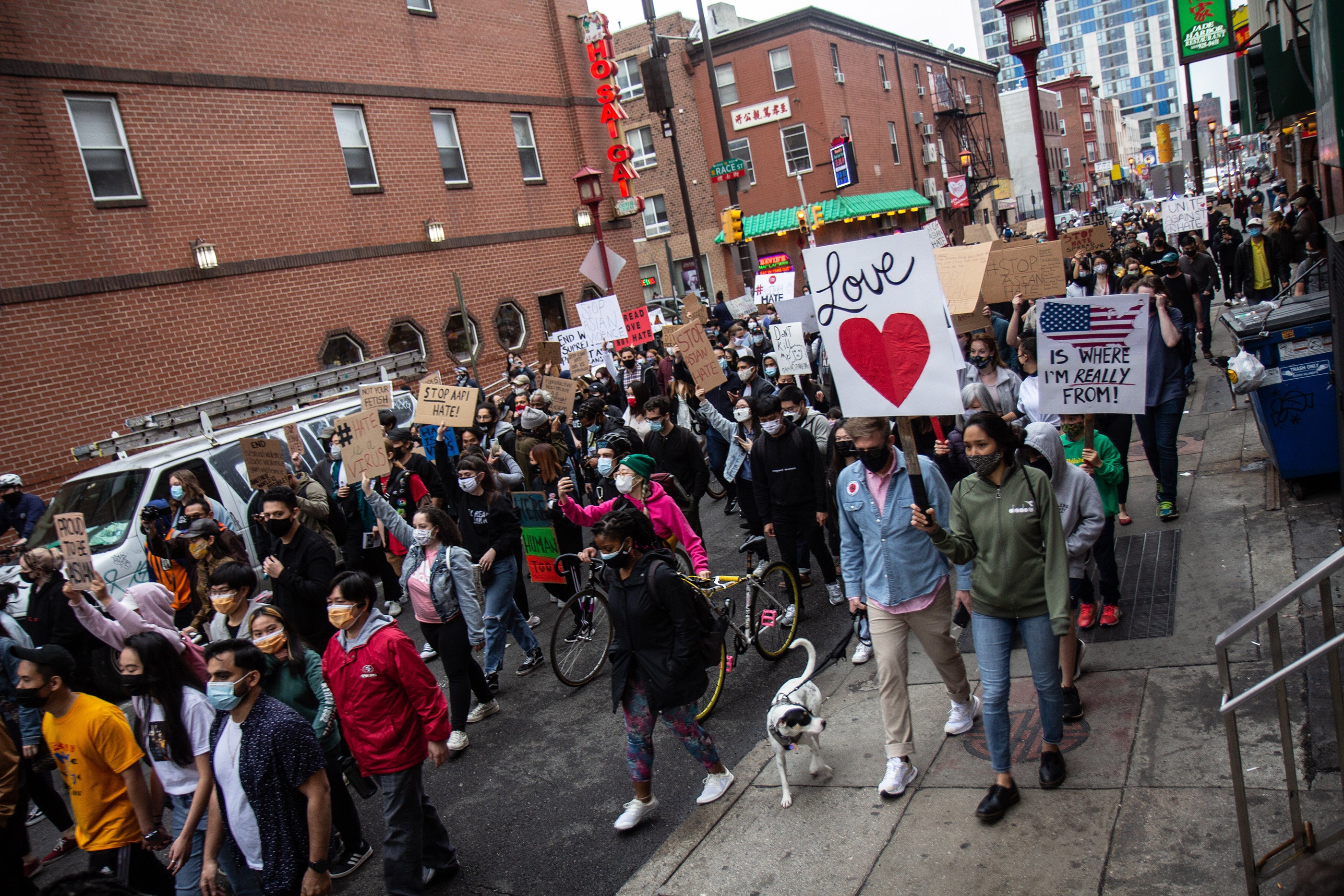
Mel Lee, director of the Woori Center, read the names of the victims to the crowd and described having flashbacks of news coverage of the shooting.
“I feel vulnerable and I do not feel safe in this country I call home,” she said.
Seared in Lee’s memory are the words of Capt. Jay Baker, Cherokee County Sheriff’s Office spokesman. In the aftermath of the shootings, Baker said Robert Aaron Long, 21, was having a “bad day.”
Law enforcement in Atlanta hesitated to describe the shootings as racially motivated, as did FBI Director Chris Wray, instead citing the gunman’s own claims he did not target the victims for their race, but because he had a “sex addiction.”
Thai
Cambodian
Vietnamese
Korean
Filipino
Chinese
Japanese
Indian
Spells
“American” #Philly4solidarity pic.twitter.com/Fv2vDtWu4y— Albert Lee (@urphillypal) March 25, 2021
Grace Fan, youth programs coordinator at Asian Americans United, called for an end to “the fetishization of Asian women” at the rally.
“This is part of the monster which reared its ugly head last week when an armed white man decided to shoot up three massage parlors killing eight people total, six of them Asian women, and somehow law enforcement questions whether or not this is a hate crime,” Fan said.
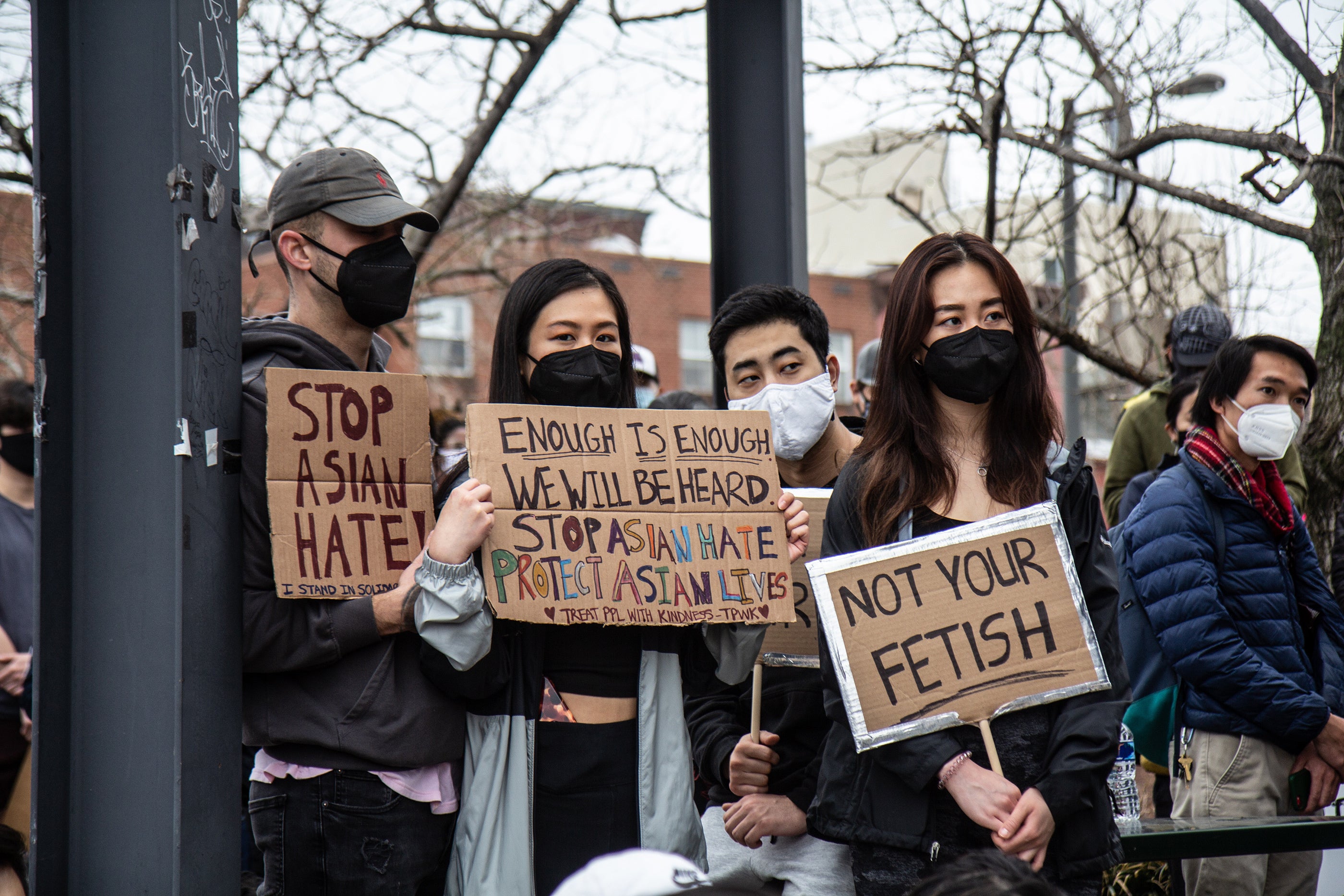
Rally-goers expressed their frustration as they marched to City Hall after the initial speaking portion of the program with the chant: “Get it right the first time; that was a hate crime.”
Once at City Hall, the group held 8 minutes of silence to honor the 8 Atlanta victims.
Asians are not silent anymore! #AntiAsianHateCrime is dehumanizing behavior; #WhiteSupremacy is a shame for killing people’s souls! #Philly4Solidarity; #UnitedWeStand;#BLM; #ALM; #AsianLivesMatter; #AsianSpaShooting; #Racism pic.twitter.com/LzAbrCCKwv
— Christie Yang (@SunshineWell5) March 25, 2021
To many in Philadelphia, divorcing race from the murders ignored the country’s past treatment of Asians in the country. That includes the 1882 Chinese Exclusion Act, which limited Chinese immigration into the U.S. and barred them from American citizenship, and the roughly 120,000 people of Japanese descent who were incarcerated by the U.S. government in internment camps from 1941 to 1946.
Ignoring race’s role in the Atlanta murder, said rally-goers, also ignores the thousands of hate incidents against people of Asian descent reported across the country, some of them targeting older Asians.
Aira de Dios said incidents like the fatal attack against 84-year-old Vicha Ratanapakdee, a retired Thai auditor living in San Francisco, lived with her. In addition to grieving the Atlanta victims, de Dios said she was mourning Ratanapakdee and 75-year-old Xiao Zhen Xie, who was punched in broad daylight, also in San Francisco.
“I don’t want that to happen to any of my family, any of my friends, and everyone around here,” said de Dios.
Other rally attendees echoed de Dios with signs that read “Protect Our Elders.”
The group Stop AAPI Hate, which began tracking hate incidents against people of Asian descent across the country in March 2020, fielded 97 reports of hate incidents in Pennsylvania.
Just this week, residents reported some anti-Chinese graffiti on 10th and Vine streets, which was also the site of a vigil held for Atlanta victims last week. Police investigated the vandalism as a potential “bias incident.”
At the rally, speakers described the toll these racist incidents have had on them and their families, including concerns that they should hide aspects of their cultures so as to avoid abuse.
Still, these incidents are widely believed by community leaders to be underreported. When asked why, residents pointed to how law enforcement discussed the killings in Atlanta.
“We are used to the fact that we don’t get a say of whether what we experience is racism or not, even though, deep inside, we know it’s racism, but we always feel scared … What if I say it’s racism and no one believes me?” Esther Hio-Tong Castillo, with the Philadelphia Chinatown Development Corporation told WHYY last week.
Nicole Hatchard, founder of the Asian American Medical Student Coalition in Philly, said while Thursday was largely for grieving, she hoped it could serve as an educational opportunity for others and raise awareness regarding anti-Asian hate in the country.
“Keeping that momentum and getting more and more people engaged … the amount of people we’re able to impact, and spread the message of solidarity to, grows every time there’s an event,” said Hatchard.
More events in support of Asian American and Pacific Islander communities are planned for Saturday and Sunday.
Ham, who traveled from New York, said these communities are dealing with their trauma now, and that concrete action would come “in time.”
“Hopefully we can organize quickly,” he said. “Because enough is enough.”
A possible first item on the agenda, said de Dios, is to get the Atlanta spokesperson who said the shooter was having a “bad day” fired.

Get daily updates from WHYY News!
WHYY is your source for fact-based, in-depth journalism and information. As a nonprofit organization, we rely on financial support from readers like you. Please give today.


